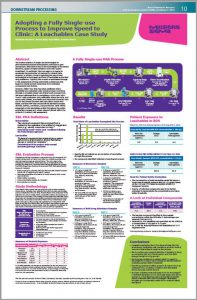 The implementation of single-use technologies for pharmaceutical product development continues to gain momentum; this trend is due to the advantages of increased flexibility, speed of implementation and lower capital investment. In particular, they are seen as a means to accelerate the production of material for clinical trials. However, a primary concern regarding the use of such technologies is the impact and level of leachables in the final drug substance. Typically this concern is addressed through a risk assessment utilizing extractable substances data based on model solvent extractions from individual components and devices. However, little if any data has been published where leachables are evaluated under actual process conditions through a complete single-use clinical-scale process train. We have addressed this by completing a pilot scale 100 L “mock” mAb production and purification where the cells, and hence mAb protein, are absent but where the bioreactor was run for the normal duration with cell culture media and feeds, and the DSP train utilized all the standard process devices, buffers, conditions, and procedures. Data will be presented on the leachables profile throughout the entire production process and, where relevant placed within the context of a patient risk assessment.
The implementation of single-use technologies for pharmaceutical product development continues to gain momentum; this trend is due to the advantages of increased flexibility, speed of implementation and lower capital investment. In particular, they are seen as a means to accelerate the production of material for clinical trials. However, a primary concern regarding the use of such technologies is the impact and level of leachables in the final drug substance. Typically this concern is addressed through a risk assessment utilizing extractable substances data based on model solvent extractions from individual components and devices. However, little if any data has been published where leachables are evaluated under actual process conditions through a complete single-use clinical-scale process train. We have addressed this by completing a pilot scale 100 L “mock” mAb production and purification where the cells, and hence mAb protein, are absent but where the bioreactor was run for the normal duration with cell culture media and feeds, and the DSP train utilized all the standard process devices, buffers, conditions, and procedures. Data will be presented on the leachables profile throughout the entire production process and, where relevant placed within the context of a patient risk assessment.
Saturday October 25, 2025
